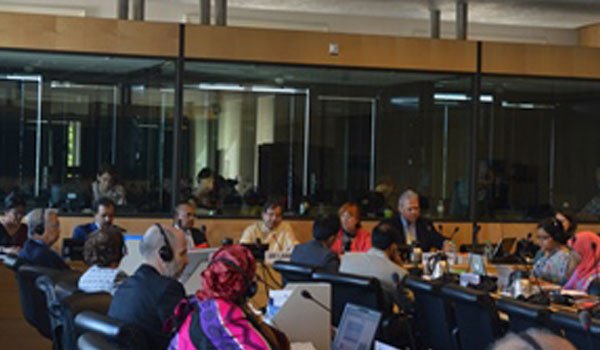Introducing the report, Ravinatha Aryasinha, Ambassador and Permanent Representative of Sri Lanka to the United Nations Office at Geneva, said that migration from Sri Lanka was not a new phenomenon, and over the years, Sri Lanka had built the necessary legal, institutional and socio-economic safeguards to address issues related to migration within the country, and in partnership with other countries. Sri Lankans today migrated mainly to the Gulf countries and they substantially contributed to the national economy: in 2014, 1.7 million migrants abroad sent home more than US $ 7 billion in remittances.
Also introducing the report, G.S. Witanage, Secretary, Ministry of Foreign Employment, said that the Sri Lankan Employment Migration Authority Act would set up a migration authority, and it would provide for the establishment of a national chamber of licensed foreign employment agencies and of a Foreign Employment Promotion Fund. Sri Lanka was the only country in the world with a dedicated national migration health policy and action plan launched in 2012, which aimed at ensuring health and social protection to various migrant and mobile population groups.
C.A.H.M. Wijeratne, Senior Director General (Legal), Ministry of Foreign Affairs, said that Sri Lanka had undertaken a voluntary commitment to introduce a National Human Rights Action Plan 2017-2012 and in May 2016, the Cabinet had approved an Inter-Ministerial Committee tasked with developing the draft plan. Sri Lanka had bilateral agreements with a number of destination countries in order to ensure better working conditions for Sri Lankans.
Samantha Jayasuriya, Deputy Permanent Representative of Sri Lanka to the United Nations Office at Geneva, recalled that Sri Lanka chaired the Colombo Process, a voluntary gathering of 12 Member States in Asia. The Process focused on five key thematic areas, which were important catalysts for safe, orderly and regular labour migration from participating countries, which accounted for over 45 million migrants.
In the discussion that followed, Experts asked about measures taken to implement the Committee’s previous concluding observations, as well as the recommendations made by the Special Rapporteur on the human rights of migrants following his visit to Sri Lanka in 2014. Women represented 49 per cent of migrant workers – more information was needed about their situation, reasons for migration and their experiences of migration, as well as about the situation of children left behind. There was a concern that the Family Background Report, prepared for each woman with children under the age of five who sought departure authorisation, was used not as a protection tool for women and children, but rather a tool to restrict the rights of women, including the right to freedom of movement; what was the impact of this measure on the irregular migration of women?
Experts were concerned about the criminalization of irregular migration and asked about steps taken to implement the Special Rapporteur’s recommendation in this regard and to consider irregular migration as an administrative and not a criminal offence. The delegation was asked about measures to address persistent corruption among migration officials, especially after the introduction of Family Background Reports; and about the grounds for the adoption of special measures leading to the detention of migrants, including migrant children and their families, and whether it was true that there were migrant children who had been detained with member of their families for up to two years.
In her concluding remarks, Khedidja Ladjel, Committee Rapporteur for Sri Lanka, said that Sri Lanka was very proactive in addressing the rights of migrant workers and this should be sustained with the ratification of the International Labour Organization Conventions N°97, N°143 and N°189.
Jose Brillantes, Committee Chairperson and Co-Rapporteur for Sri Lanka, in his closing remarks, noted that Sri Lanka played a key role in the issue of migrant workers protection; its efforts against illegal recruitment and on the regulation of employment agencies offered guidance to others.
Jasminka Džumhur, Committee Vice-Chairperson, thanked the delegation for the very comprehensive dialogue, which was a method that other States parties should use as well.
Ambassador Aryasinha said in his final remarks that Sri Lanka took the welfare of its migrant workers very seriously and sought to be at the regional and international forefront of ameliorating difficulties they faced; it would continue to do so in the future with the support of this Committee and other United Nations bodies.
The delegation of Sri Lanka included representatives of the Ministry of Foreign Employment, Ministry of Foreign Affairs, Sri Lankan Bureau of Foreign Employment, and the Permanent Mission of Sri Lanka to the United Nations Office at Geneva.






